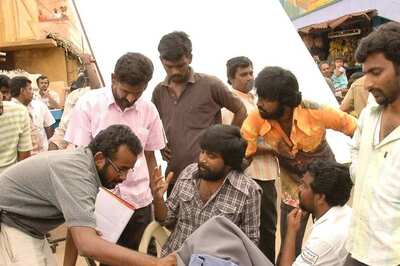
views
Yaounde: About 130 west Africans were feared drowned on Thursday after a boat sank off Cameroon, Cameroonian naval and government officials said.
According to the first accounts that sailors obtained from survivors, about 150 people were aboard the long wooden boat when it capsized at around 0300 GMT on Wednesday off the Cameroon fishing town of Kribi.
Navy and fishing crews were able to pick up 23 survivors, who came from Nigeria, Mali, Benin and Burkina Faso.
They said the pirogue -- a simple open boat with plank seating of a kind used throughout Africa -- had left the Nigerian town of Orong heading south towards Gabon's economic capital, Port Gentil.
After it sank, local fishermen swiftly raised the alarm and a Cameroon naval vessel went to the rescue with the help of volunteers. Naval ships and fishing pirogues were still searching the area on Thursday, trying to find other survivors, said a communications ministry spokeswoman, Liliane Bobe.
"As far as we know, the passengers on this boat were planning to get to Port-Gentil in the hope of finding work there," Bobe said.
The 23 people pulled from the sea in the densely populated region where west and central Africa meet were still under medical observation at health centres in Londji and Itongue, near Kribi, Bobe said.
There were no details of why the boat capsized in the early hours of Wednesday morning.
It is the second such tragedy in less than a year off Cameroon -- 43 people drowned when a boat carrying passengers from Nigeria to Gabon sank off Campo off the southern coast of the country last June.
About 70 people, including large numbers of Beninese, were on the Cotonou when it sank in heavy seas on June 30.
Meanwhile, hundreds of African migrants have drowned trying to reach Spanish soil in unseaworthy vessels.
Figures published on Tuesday in the Spanish press showed that between 1,200 and 1,600 illegal immigrants who tried to reach Spain from Mauritania in tiny boats drowned in a 45-day period in late 2005. The press reports quoted an internal police memorandum.
Despite joint international action to prevent clandestine migration, thousands of people from the poorest parts of Africa seek to leave their homes, sometimes in the hope of ending somewhere where they can earn money to send back to their families.
Boat owners and desert smugglers alike make a great deal of money from offering to help such people, though the would-be emigrants risk their lives in the process.




















Comments
0 comment